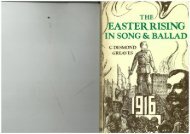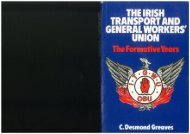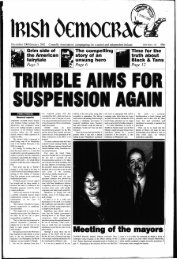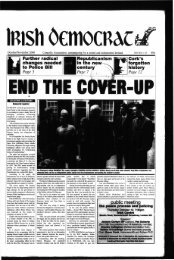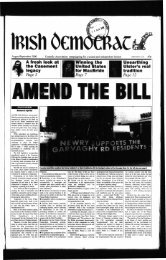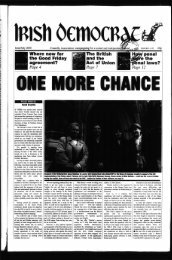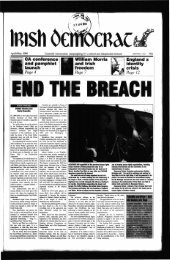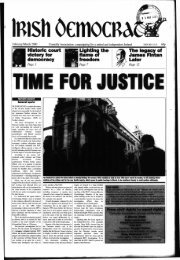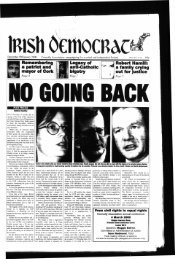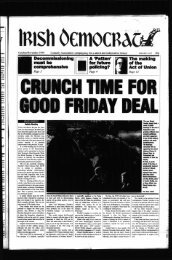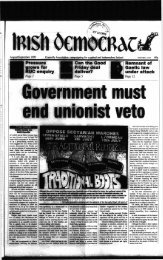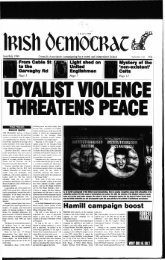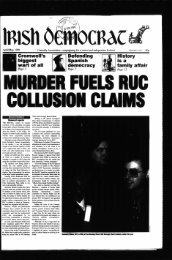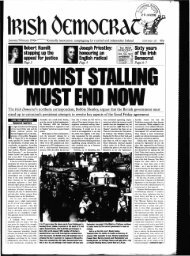Create successful ePaper yourself
Turn your PDF publications into a flip-book with our unique Google optimized e-Paper software.
Special Easter<br />
Number<br />
if<br />
r<br />
/<br />
DOM<br />
APRIL, <strong>1943</strong> Price 2d. i<br />
m? *<br />
•"I :<br />
T - - j ' 1 BH<br />
. tJf<br />
M'<br />
| if<br />
M<br />
1 !' I ,<br />
I<br />
if<br />
Ir<br />
II<br />
I! if<br />
Ill<br />
I?!<br />
IT<br />
CONTENTS<br />
Easier Celebrations and<br />
Meetings • . .<br />
World Comment, by C. D.<br />
Greaves • • •<br />
They Kindled a Blaze,<br />
by T. A. Jackson<br />
<strong>Irish</strong> Work, Lik0 Hell,<br />
:; by Jim Keehan #<br />
Books and Slims, edited<br />
h y A ^ M y . *<br />
torriiont > anW Civil<br />
m<br />
Page 2<br />
*<br />
Page 3<br />
nil<br />
-t<br />
*«|e 4<br />
ML<br />
l<br />
I<br />
-f<br />
i<br />
I
IRISH<br />
FREEDOM<br />
'KYLECLARE' FEARED LOST<br />
the Soviet people.<br />
I look forward to the days when we<br />
thall have Anglo-<strong>Irish</strong> weeks, Anglo-<br />
Indian weeks. Anglo-Spanish weeks, and<br />
Anglo-Chinese w eeks in the same way that<br />
we now l;arr Anglo-Russian weeks. Good<br />
wishes to your paper. As an Englishman<br />
I promise 2s. 6d. minimum per month to<br />
your Fund.<br />
LES. BATES.<br />
N 1913 I was attending a Socialist Sunday<br />
school where we sang a song<br />
I<br />
about Jim Larkin, "Helping the poor starving<br />
devils in Dublin," and my namesake,<br />
Harry Gosling, who is no relation of mine,<br />
was on a deputation to this place—the<br />
C.W.S., Manchester—to ask for food for<br />
Ireiand in the name of the Transport<br />
Workers of England. Harry Gosling has<br />
now passed away and the world is poorer<br />
by the loss.<br />
The C.W.S. is. however, still growing— .<br />
trade £157 million last year—and are still I<br />
! prepared to help justice with £1,000 loan<br />
to the "Daily Worker." Whilst political<br />
iieedom is vital and important, India and<br />
Ireland are causes I support. Eeconomic<br />
freedom is one of the first <strong>Freedom</strong>s, and<br />
much great work yet remains to be done<br />
to extend co-operation. We have a war<br />
and a world to win. I am sending by<br />
separate post a "History of the C.W.S."<br />
with a photograph and the story of the<br />
1913 Food Ship recorded in its pages.<br />
H. G. GOSLING,<br />
Secretary, London Co-operative Society.<br />
I<br />
READ your paper, "<strong>Irish</strong> <strong>Freedom</strong>," for<br />
the first time last week. Please send<br />
me details of the Connolly Club. I am not<br />
an <strong>Irish</strong>man, but I refuse to believe the<br />
tales and stories about the <strong>Irish</strong> being<br />
traitors because one part is neutral and<br />
not fighting on our side in the present war,<br />
also I don't believe all the <strong>Irish</strong> are connected<br />
with the I.R.A. I have but one<br />
aim, that is to learn more of or about Ireland<br />
than I do at present, and to pass the<br />
knowledge and all that I learn about the<br />
<strong>Irish</strong> people on to other people. J am 28<br />
J years of age, and an engineer by trade. I<br />
jknow little of politics and I am in the<br />
;A.E.U. I have written this in my dinner<br />
J hour, and the whistle to start work is due<br />
'any minute. I can give 5s. a month to<br />
•'the <strong>Irish</strong> <strong>Freedom</strong> Fund.<br />
ALBERT YOUNG.<br />
"OUR President was elected as our represen-<br />
' tative at your meeting in Luton.<br />
I wish you all success in your endeavours<br />
s o enlighten the Luton public on <strong>Irish</strong> mati<br />
crs, particularly as they affect the working<br />
':Iass. Much ill-informed criticism has been<br />
nade of the <strong>Irish</strong> owing to the effective propaganda<br />
put over by those who do not wish<br />
•o see the people of Ireland united, not<br />
nerely in a geographical sense but in the<br />
•ause of world-wide emancipation of the comnon<br />
people.<br />
My knowledge of <strong>Irish</strong> affairs is limited<br />
)Ut my desire for common understanding of<br />
he problems that affect the common people<br />
if the world is certainly not.<br />
The Luton Trades Council is very sympathetic<br />
with the cause of a United Ireland,<br />
aid above all a united working class movement.<br />
C. E. I.YWOOD, Hon. Secretary,<br />
Luton, Dunstable and Dist. Trades Council.<br />
SXYLECLARE, a Limerick Steamship Company vessel, is missing. She<br />
x<br />
_ , • :„„:„„ cim<br />
carried a crew of 18 <strong>Irish</strong>men, whose relatives have been notified that<br />
she is considerably overdue and that the company is gravely concerned for<br />
D e a r E d i t o r . . . her safety. The ship sailed front Lisbon for Dublin on February 20th, and<br />
H<br />
no news of her has since been received. The Kerlogue. a Wexl'ord Steamship<br />
Company vessel, which left Lisbon oh the day previous to the Kyleclare,<br />
ERE IS 5S. for the '•<strong>Freedom</strong>," which is<br />
great stuff. I look forward to the<br />
. v wh"n the manufactured barriers that has arrived in Ireland. The normal passage from Lisbon to Dublin takes<br />
v.and between British and <strong>Irish</strong> workers live days<br />
...;; 'oo as realistically smashed as the<br />
"V^INE <strong>Irish</strong> vessels have been lost since<br />
-..:r. • barriers have been smashed which<br />
' 1940. In addition, the <strong>Irish</strong> Pine, which<br />
oncc between we English people and<br />
carried a crew of 33, has been reported missing<br />
and is presumed lost.<br />
RESTORE TERRITORY<br />
AND LANGUAGE<br />
-DE YALERA<br />
ROADCASTING from Radio Eireann on<br />
B St. Patrick's Day, Mr. De Valera made a<br />
stirring appeal for the revival of Gaelic language<br />
and culture.<br />
"It was the idea of such an Ireland." said<br />
Mr. De Valera, "that fired the imagination of<br />
our poets; that made successive generations<br />
of patriotic men give their lives to win religious<br />
and political liberty."<br />
"Is this Utopia?" he asked, and then replied<br />
"No; but the practicable object of those<br />
who know our resources. To seek it is the<br />
solemn, unavoidable duty of every <strong>Irish</strong>man."<br />
He concluded, "The restoration of the unity<br />
of the national territory and restoration of<br />
the language are the greatest of our uncompleted<br />
tasks."<br />
M<br />
Easter<br />
Lilies<br />
BRANCHES, Camps, Sites, and<br />
" individuals—send cash with<br />
your orders to "<strong>Irish</strong> <strong>Freedom</strong>,"<br />
150 Southampton Row, London,<br />
W.C.1. 1/6 per doz.'or 2d. each<br />
ARRESTED IN CORK<br />
ORTIMER LUCY, who escaped from<br />
Mount joy some time ago with three<br />
others, including his brother Michael, was<br />
arrested in Cork. Michael O'Driscoll (22), a<br />
native of Cork, who escaped from Portlaoighise<br />
prison, was reported still at large<br />
as we go to press.<br />
London Member<br />
Expelled<br />
OR consistent disruptive activity, Mr. J.<br />
F Flanagan has been expelled from the<br />
Connolly Club by its London District Committee.<br />
Mr. Flanagan failed either to appear<br />
at the London District Committee meeting or<br />
to send a statement as requested. Mr. Flanagan<br />
was formerly attached to the Dagenham<br />
Branch, and has recently been attached<br />
to West London and Harlesden. It should be<br />
understood that the Connolly Club is in no<br />
way responsible for Mr. Flanagan's actions or<br />
views, neither of which are compatible with<br />
membership of the Connolly Club.<br />
WATERFORD<br />
THE CREW<br />
The crew of the Kyleclare on her trip to<br />
Lisbon was: Captain A. R. Hamilton (551,<br />
married, Dalvsfort Road, Salthill, Galway;<br />
First Officer Diarmuid de Burca (29), married,<br />
35 Raglan Road, Dublin; Second Officer<br />
Ultan Tobin Todd (21), single, 7 Brookville,<br />
Coolock, Co. Dublin; Bosun P. Hopkins (42).<br />
widower, 8 Pigeon House Road, Dublin; First<br />
Engineer W. J. Simms (61), married, Donadee,<br />
Co. Kildare; Second Engineer T. Brady<br />
(54), married, 6 New Road, Galway; Able<br />
Seamen E. Barn' (32), married. Streamstown,<br />
Tagoat, Wexford; T. Lunch (51), married,<br />
Clogerhead, Co. Louth; P. Brannock<br />
(38), single, 47 Pidgeon House Road, Dublin;<br />
R. O'Brien (24), single, 5 Lower Merrion<br />
Street, Dublin; Seaman D. Mooney (24).<br />
single, 41 Oak Road, Donnycarney; Firemen<br />
J. Morgan (36), married, 13 Newmarket<br />
Street, Dublin; W. O'Brien (25), married, 148<br />
Pearse Street, Dublin; Jas. Larkin (28), married,<br />
101 Seville Place, Dublin; P. O'Neal<br />
(24), single, 23 Cumberland Street, Dun<br />
Laoghaire; Donkeyman T. Ryan (42), married,<br />
2 Hayestown, Rush, Co. Dublin; Steward<br />
Daniel O'Brien (57), married, 43 Botanic<br />
Avenue, Glasnevin, Dublin; Cook Richard<br />
Grimes (57), married, 31 Bolton (Street,<br />
Dublin.<br />
LARKIN<br />
DUBLIN<br />
M<br />
PRESIDENT<br />
T.U.C.<br />
OF<br />
R. JAMES LARKIN, Senr., has been<br />
unanimously elected president of the<br />
Dublin Trades Union Council, in succession<br />
to Mr. A. Jackson.<br />
The Dublin Trades Union Council consists<br />
of delegates from sixty affiliated trade unions.<br />
Its function is to co-ordinate the activities of<br />
trade unionism in the city.<br />
All the principal trade unions in Dublin,<br />
with the exception of the Transport and<br />
General Workers', the National Union of<br />
Raifwaymen, and the Railway Clerks' Association,<br />
are affiliated to it.<br />
KENSINGTON GIRL FINED<br />
Tj^OR trying to send a letter out of England<br />
J- otherwise than by post, an <strong>Irish</strong> girl,<br />
Ellen Hanley, Sheffield-terrace, Kensington,<br />
was fined £3 at West London. Detective-Sergeant<br />
Gagan said that when a woman was<br />
searched at Holyhead before sailing, a letter<br />
addressed to Miss Hanley's mother in Dublin<br />
was found concealed under her clothing.<br />
TRAGEDY<br />
"MINE people were killed and seventeen badly injured when a 25-foot high<br />
wall of the disused Waterford Jail crumbled and fell on five houses.<br />
Names of dead' James Barrett (13}), Pat-<br />
rick Upton (15), Joseph Upton (60), Betty<br />
Stewart (2J), Kitty Barrett (6), James Roche INDIAN WHITE PAPER<br />
(6), Maureen Roche (20), Thomas Roche HE White Paper issued by the British<br />
(55), and an unidentified woman. T Government (Cm. 6430, March <strong>1943</strong>)<br />
Injured: Thomas Power (22), Michael purports to fix on the Congress and its leaders<br />
Power (14), James Stewart (11), John Stewart,<br />
father (60); Thomas Skehan (60). John Iodia in 1942-<strong>1943</strong>.<br />
the responsibility for the disturbances in<br />
Upton (18), Albert Roche (11), Patrick Barrett<br />
(17), Agnes Roche (21), Mary Roche tical and economic issues of the Indian situa-<br />
It is not a document dealing with the poli-<br />
19), Joan Rochp (15), Margaret Barrett (40), tion, nor does it contain any statement of<br />
Mary Barrett (15), Phyllis Barrett (13), May policy or any suggestion for ending the deadlock<br />
and reaching a settlement in India. As<br />
Barrett (2), Mary Skehan (34), and Susan<br />
Stewart (21). "<br />
a contribution to an appreciation or assessment<br />
of the situation it has little value, nor<br />
CORRESPONDENTS<br />
can it be regarded as an historical document.<br />
en when M.S. bears a pseudonym, names YOU CAN (1) PASS THIS COPY ON; It is a truth description to call this White<br />
and addresses, not necessarily for publication,<br />
should be given. Anonymous corres-<br />
(2) TAKE SUPPLIES FOR YOUR AREA; Paper a piece of specious and clumsy special<br />
pondence cannot be published. 1<br />
(3) COLLECT FOR OUR FUND NOW. pleading.<br />
EASTER<br />
LONDON:,<br />
HOLBORN HALL, THEOBALD'S ROAD,<br />
HOLBORN. EASTER SUNDAY, 3.30 p.m.<br />
BIRMINGHAM:<br />
BULL RING, BIRMINGHAM.<br />
EASTER SUNDAY, 3 p.m.<br />
CELEBRATIONS<br />
MEETINGS<br />
LIVERPOOL:<br />
COOPER'S HALL, Shaw St., LIVERPOOL.<br />
EASTER SUNDAY, 7 p.m.<br />
BIRKENHEAD:<br />
ENGINEERS' HALL, BIRKENHEAD,<br />
EASTER SUNDAY, 3 p.m.<br />
For LEICESTER, OXFORD and NORWICH, SEE LOCAL POSTERS. NATIONAL SPEAKERS.<br />
DANCES<br />
LONDON:<br />
LIVERPOOL:<br />
ALLENBY SERVICES CLUB, Hand Court, SOCIAL AND DANCE, COOPER'S HALL,<br />
Red Lion Street, HOLBORN.<br />
- SHAW STREET, LIVERPOOL.<br />
SATURDAY, APRIL 17th, 7-11 p.m. Bar. 2/-<br />
SATURDAY, APRIL 24th.<br />
<strong>April</strong>, <strong>1943</strong><br />
EASTER GIFTS<br />
are especially welcome to "<strong>Irish</strong> <strong>Freedom</strong>."<br />
bu also gifts all the year to enable us lo produce<br />
your paper.<br />
We hope you like our Easter issue, and that<br />
you will pass it on to secure an even greater<br />
number of readers and financial supporters<br />
for the paper.<br />
Money is badly needed. The Fund is very<br />
low lliis month, and to produce this Special<br />
costs are very high. Quick settlement by our<br />
sellers and a constant flow of contributions<br />
will help enormously. If, as an <strong>Irish</strong>man, you<br />
feel proud of this issue, won't you send us a<br />
donation NOW?<br />
Per Les Bates, 5s.; Flann Campbell, CI 2s.;<br />
K. Dooley, 2s.; T. McK., 4s.; Mrs. Whitehead,<br />
7s.; Some Friends in Birmingham (per J.<br />
Hughes), lis.; Larry Lowther, 10s.; Albert<br />
Young, 5s.; B. Doyle, 3s.; E. Moris, 2s.; A<br />
Sailor, £1; Collection at Dance (London),<br />
£1 14s.; <strong>Irish</strong>men at Orlitts, 17s.; H. Bonnington,<br />
7s.; Ked Ruth, 5s.; "Watts Engineers,"<br />
10s.; Dr. Milligan, 7s.; Total, $8 lis.<br />
GET ON THE JOB NOW<br />
I/WE guarantee to make <strong>Irish</strong> <strong>Freedom</strong> Fund<br />
a weekly/monthly donation of<br />
Name<br />
Address<br />
(Cross out sections which do not apply)<br />
Post to IRISH FREEDOM, Premier House,<br />
150 Southampton Row, W.C.I.<br />
YOU CAN BUY<br />
<strong>Irish</strong> <strong>Freedom</strong>'<br />
HERE<br />
LOKDON:<br />
THAMES BOOKSHOPS LTD.<br />
Branches fit<br />
CAMDEN TOWN—45 Parkway. N.W.I.<br />
EAST LONDON—20 Wliitechapel, High Street,<br />
HARROW—300, Station Eoail, Harrow, Middlesex.<br />
I'EOKHAM—91 Peckliam, IliKh Street. S.E.15.<br />
TOOTING—28 Mitcham Road, S.W.17.<br />
HAYES (Mdx.)—83 Station Road.<br />
SOUTH-EAST—91 Peckhnm High St., S.E.15.<br />
ACTON—2 Church Road, W.<br />
SOUTH-WEST--28 Mitcham Road, Tooting Broadway,<br />
S.W.17.<br />
NIXON—5 Stamlord, Brook Road, I/indon, W.6.<br />
NEWSAGENT - 215 Westbourno Park Road.<br />
London. W.ll.<br />
COLLET'S BOOKSHOP. 66 Charing Crops Road,<br />
W.C.2.<br />
MR. ROGERS, Newsagent, High Street, Harlesden,<br />
London, N.W.<br />
PROVINCES:<br />
BIRKENHEAD - Progressiva Bookshop, 164<br />
Chester Street.<br />
BIRMINGHAM—Key Books. 42 Holloway Head<br />
1 Colonnade Passage, New Street, and 115<br />
Dale End.<br />
BRADFORD—The People's Bookshop, 60 Thornton<br />
Road.<br />
BRIGHTON—The People's Bookshop. 90, Trafalgar<br />
Sqnare, Brighton, 1.<br />
BRISTOL—We«t of England People's Bookshop,<br />
8 West, Street.<br />
CAMBRIDGE - Maclaurin's Bookshop, Rose<br />
Creseont.<br />
CARDIFF—"South Wales Iftiokshop, 119a Queen<br />
Street.<br />
OHATHAM — Progressive Books, 277 High Street,<br />
Chatham.<br />
OH E I.TE N11A M — People's Bookshop, 80 High<br />
Street.<br />
COVENTRY—People's Bookshop, 39 Jordan Well.<br />
KXETER-Poop'e's Bookshop. 8 New Bridge St.<br />
EDINBURGH-The PmgrefMivo Bookshop, 37<br />
Lothian Ito'ad, Edinburgh.<br />
(GLASGOW—Collet's Bookshop, la Dundas Street,<br />
and Civile Hooks, 3 Ilothwell Street, Glasgow.<br />
C.2.<br />
GLOUCESTER—The Left Bookshop. 124 Barton<br />
Street.<br />
KING'S I.YNN-Modem Bookshop, 7 Tower Street.<br />
LEEDS—Progressive Bookshop, 45 Woodhouse<br />
Lane.<br />
LIVERPOOL-Norton Bookshop, 18 Norton Street;<br />
Mrs. Johnson, King Stroot, Garpton,<br />
Liverpool.<br />
LUTON-The Bookshiip, 38 Castle Street.<br />
MANCHESTER—Collet's Bookwhop, 13 Hanging<br />
Ditch.<br />
MIDDLENRORO—Modern Bookshop, 61 Borough<br />
Road, and Mr It. Parrish, 79 Linthorpe<br />
Itoail.<br />
MoRKCAM BE -Tom Piatt and Sons, 34 Qui i n<br />
Street.<br />
NEWCASfTLE ON TVM: l\n|)le's Bookshop. 118<br />
Wi*stgate Road, and ( avion House, Cross<br />
Street.<br />
NORTHAMPTON Mr. Goodman, 29 Khihur.-I<br />
A ven ur.<br />
NOTTINGHAM —189 Huntingdon Styet.<br />
OXFORD The Bookshop, 3i> Hi the Bridge Street.<br />
PLYMOUTH 3 WlnDijile Street.<br />
READING- People'.- Bookshop. 83 London Street.<br />
SHEFFIELD The Sheffield Bookshop, 85 Carver<br />
Slri-el.<br />
STOCKTON-ON-TELS People's Bookshop, 20<br />
Nelson Terrace.<br />
SWINDON-People's Bookshop, 73 Commercial<br />
Road.<br />
WA'ri:itFORD-l Temple !!...>.<br />
Or from<br />
CENTRAL BOOKS LTD..<br />
2 PAltTON STREET. LONDON, W.C.I.<br />
(Tol. ; Chancery 6166).<br />
WE WILL POST TO IRELAND. Readers wish<br />
Ing to send "<strong>Irish</strong> <strong>Freedom</strong>" to friends in Inland<br />
should send us name and addr^ 'ri lr.' in
IRISH FREEDOM, <strong>April</strong> <strong>1943</strong><br />
Easter Rising, 1916<br />
THEY KINDLED HERE A LIVING BLAZE<br />
by T. A. Jackson<br />
I<br />
ft<br />
c<br />
I;<br />
V<br />
n<br />
Jp<br />
1!<br />
•a<br />
si<br />
n<br />
%<br />
tj<br />
tl<br />
n<br />
n<br />
a<br />
lE<br />
k<br />
I:<br />
. V<br />
;A<br />
! a<br />
; .tl<br />
WE MUST<br />
NOT FORGET<br />
Proclamation of<br />
The <strong>Irish</strong> Republic, 1916<br />
"Tliey rose in dark and evil days<br />
To right tlicir native land.<br />
They kindled here a living blaze<br />
That nothing shall withstand.<br />
Alas, that might could vanquish right:<br />
They fell and passed away.<br />
But true men, like you men,<br />
Are plenty here to-day!"<br />
"* ASTER fell late in 1916, about ns late<br />
J<br />
Hj<br />
as it can fall, and the sun on Easter<br />
Monday morning, as the early mists<br />
cleared, shone out bright, warm and glorious.<br />
As noon neared its rays gathered<br />
strength, and the crowd at the tram termini<br />
by the Nelson Pillar, in their holiday<br />
finery," thought of nothing but getting<br />
away to the hills or the seashore.<br />
It was a grand day for the Punchestown<br />
Races, where most of the English officers<br />
and men in garrison had gone for the<br />
afternoon.<br />
There was little traffic, barring the<br />
trams and a few cars speeding out on their<br />
joy rides. Only a fraction of the usual<br />
throngs were left on the side-walks of<br />
O'Connell Street, and they were more disposed<br />
to lounge idly down to the Liffey or<br />
sun themselves against a wall, than to do<br />
anything energetic. It was an ideal Bank<br />
Holiday; a day for dozing in the sun; for<br />
leaning over a quay-wall or just standing<br />
and staring.<br />
By that same token there was something<br />
to stare at. Nothing very wonderful, but<br />
just something—a company of men in uniform<br />
debouching from Abbey Street and<br />
turning thence northwards towards the<br />
Pillar and the G.P.O.<br />
LESS THAN A HUNDRED<br />
"IV70T a large company—less than a hundred—mostly<br />
in the dark green of<br />
the Citizen Army; but including a few in<br />
' In the name of God, and her dead<br />
generations . . . Ireland, through us<br />
summon her children to her flag, and<br />
strikes lor her freedom . , ."<br />
As he spoke a crackle of rifle-fire away<br />
southward, towards the Castle, echoed by<br />
others—from the westward, towards the<br />
Four Courts, and south-eastward, from<br />
Stephen's Green, told that the battle had<br />
begun.<br />
Patrick Pearse finished reading with tlit'<br />
cry of "God Save Ireland," and above his<br />
head. 011 the pedestal above the front<br />
porch of the Post Office broke three flags:<br />
011 the right and left flew Republican tricolours<br />
of green, white and orange; in the<br />
oentre a large green flag inscribed in<br />
letters of gold:<br />
'POBLACHT NA H'EIRcANN"<br />
As the flags lifted and fluttered in the<br />
sunshine, while renewed rifle-fire from<br />
the distance gave them a salute, James<br />
Connolly, Watching from the road with<br />
J"om Clarke by his side, grasped his old<br />
companion's hand:—<br />
"Thanks be to God, Tom, that we have<br />
lived to see this day!"<br />
IRISH NATIONALIST<br />
REPUBLICANISM<br />
N their differing ways these three men,<br />
I Clarke, Pearse and Connolly summed<br />
up and embodied the three main strands<br />
which together made up the completed<br />
unity of <strong>Irish</strong> Nationalist Republicanism.<br />
Tom Clarke, the oldest of the three,<br />
represented the old Fenian tradition, the<br />
tradition of physical force, resistance without<br />
qualifications or deviations. While<br />
too young himself to have taken part in<br />
either the '65 or the '67, he knew intimately<br />
the leading men who had done so,<br />
the Gaelic language, and for the revival<br />
of all the cultural corroliaries of the<br />
Gaelic speech.<br />
At the same time, he, too, was, and had<br />
been from childhood, inspired by the direct<br />
Fenian tradition.<br />
What was most notable about Pearse, as<br />
well as his great literary gift, was the<br />
readiness with which he responded to<br />
Connolly's suggestion that reviving the ancestral<br />
culture of the Gael involved getting<br />
rid of the capitalist property-relations<br />
which the English conquest had planted in<br />
Ireland. That, Connolly urged, could<br />
more easily be done by going forward than<br />
by attempting to roll back the wheels of<br />
history.<br />
Pearse grasped the point, and saw its<br />
full implications. Though a fervent<br />
Catholic himself, he withstood staunchly<br />
the howl of clerical indignation which was<br />
worked up against Larkin and Connolly in<br />
the Dublin Labour War of 1913. Pearse<br />
was outspoken and unflinching in his support<br />
of the hard-pressed and muchmaligned<br />
Larkinite Trade Unionists:—<br />
"Here it a matter," he wrote, "in which<br />
I cannot rest neutral. My instinct, is<br />
with the landless man against the<br />
lord of land and with the breadless<br />
man against the master of<br />
millions. I may be wrong, but I<br />
do hold it a most terrible sin that<br />
there should be landless men in this<br />
island of waste yet fertile valleys, and<br />
that there should be breadless men in<br />
this city, where great fortunes are made<br />
and enjoyed."<br />
And it was in his conviction that these<br />
things could not and would not be tolerated<br />
in a free Ireland that Pearse threw<br />
himself into the Volunteer Movement and<br />
implicit, in the Fenian Movement of '65<br />
and '67, in the teaching of Fintan Lalor,<br />
and in the struggles of the Land League,<br />
which translated those teachings into<br />
practice.<br />
Avowing himself the heir of thege traditions<br />
he poured scorn 011 the compromising<br />
bourgeois Parliamentarians; and at a<br />
time when the Fenian tradition had<br />
shrunk to its narrowest compass, he dared<br />
to use again the name Ropublican with<br />
the 'to somei terrifying qualification of<br />
Socialist. This he did while Tom Clarke<br />
was still in gaol, and while Pearse was still<br />
an undergraduate at the university. Even<br />
those who could not stomach the strong<br />
meat of Connolly's Socialism could still be<br />
roused to enthusiasm by the courage and<br />
skill of the advocate who could vindicate<br />
the Gaelic clans, the United <strong>Irish</strong>men, the<br />
Fenians, the White Boys and the Land<br />
League, better than disciples who regarded<br />
these doctrines as finalities beyond which<br />
it was not possible to go.<br />
In the history of revolutionary struggle<br />
all round the earth, it is common to find<br />
the sturdy workman, labourer or artisan,<br />
inured to hardship by his life-conditions,<br />
and driven desperate by necessity, fighting<br />
side by side with the student-intellectual,<br />
who is inspired by a scholar-artist's<br />
vision of the world as it might be if men<br />
were only wise, generous and courageous.<br />
Tom Clarke stood for the workman—the<br />
revolutionary fighter of the type such as<br />
never failed to appear in command of a<br />
barricade in every fight in Paris from the<br />
10th of August, 1792, to the bloody suppression<br />
of the Commune in May, 1871.<br />
Patrick Pearse equally well incarnated<br />
the student-artist who was no less perennial<br />
in those days of the barricades.<br />
"Let 110 man be mistaken as to who will be lord<br />
in Ireland when Ireland is free.<br />
b e l o r d a n d m a S t e r ^ - P a d r a / c Pearse.<br />
The people will<br />
lnmation stands out as a landmark, as it<br />
does also in its promise that a permanent<br />
Government of the <strong>Irish</strong> Republic, when<br />
set up, would be "elected by the suffrages<br />
of all men and women m Ireland."<br />
LESSON FOR<br />
TO-DAY<br />
"I T is from the vantage-ground of this<br />
declaration of the most advanced<br />
democracy, republicanism and socialism,<br />
that we must evaluate Easter Week<br />
against the background of to-day.<br />
That "England's difficulty is Ireland's<br />
opportunity" any man of sense can see,<br />
and any fool can say. It takes a ;nan of<br />
genius, courage, and steadfastness to see<br />
beyond the form of the catch-phrase to<br />
the wider historical and political essence<br />
involved.<br />
A parrot, if it could speak, could say<br />
that because Clarke, Pearse and Connolly<br />
rose in 1916, while England was at war,<br />
therefore they would have done the same<br />
111 <strong>1943</strong>.<br />
When French "Jacobinism" was regarded<br />
with scandalised horror by all the<br />
"respectable" and "genteel" in Dublin, as<br />
well as London, Wolfe Tone sided joyfully<br />
with the Jacobins.<br />
When all the "men of sense and moderation"<br />
in Ireland, as in England, held up<br />
their hands in horror at the alleged scandalous<br />
goings-on of the English Chartists,<br />
Thomas Davis gravely urged his colleagues<br />
of the Nation to cultivate the<br />
friendship of the English Chartists.<br />
No leader of <strong>Irish</strong> revolt of the first<br />
grade ever failed to take into account the<br />
degree of development of the progressive<br />
forces in England as well as on the Continent<br />
of Europe.<br />
O<br />
UNBOUGHT,<br />
UNTERRIFIED<br />
F Connolly, the Socialist Internationalist,<br />
it is needless to speak. From<br />
Pearse it is only necessary to quote a<br />
classic passage from the last pamphlet<br />
he was fated to write:—<br />
"There is no other sort of nationalism<br />
than this, the nationalism which believes<br />
in and seeks to enthrone the sovereign<br />
people. Tone had appealed to that<br />
numerous and respectable class, the men<br />
of no property,' and in that gallant and<br />
characteristic phrase he had revealed his<br />
perception of a great historic truth,<br />
namely, that in Ireland the gentry (as<br />
they afiect to call themselves)' have<br />
uniformly been corrupted by England,<br />
and the merchants and middle-class<br />
capitalists had been, when not corrupted,<br />
uniformly intimidated, whereas the common<br />
people have, for the most part,<br />
remained unbought and unterrified.<br />
"It is in fact true that the repositories<br />
of the <strong>Irish</strong> tradition as well, the<br />
spiritual tradition of nationality and the<br />
kindred tradition of stubborn physical resistance<br />
to England, have been the great,<br />
splendid, faithful common people—that<br />
dumb, multitudinous throng, which sorrowed<br />
through the Penal night, which<br />
bled in '98, which starved in the Famine;<br />
and which is here still—what is left of<br />
it—unbought and unterrified.<br />
"Let no man be mistaken as to who<br />
will be lord in Ireland when Ireland is<br />
free. The people will be lord and<br />
master."<br />
Can you, can any man with sense and<br />
conscientiousness, imagine the author of<br />
those moving words lending his aid for<br />
a moment to the bloody baboonery of Hitlerite<br />
Fascism—even to secure the defeat<br />
of England? Can you imagine Tone,<br />
Davis, Mitchel, Lalor, Rossa or Tom Clarke<br />
doing such a thing? Can you imagine<br />
Connolly doing so—the Connolly whom<br />
Hitlerite thugs would have murdered in<br />
preference to any other man living in his<br />
day?<br />
He who imagines for a moment that<br />
Clarke, Pearse or Connolly would for any<br />
chance of gain, personal or political, have<br />
risked a world-defeat for democracy and<br />
the common people, knows nothing of<br />
them, and is unworthy of the honour of<br />
celebrating the splendour of their sacrifice<br />
in Easter Week, 1916.<br />
In order to prevent the further slau^tar of Dublin<br />
citiztne, and in ths hope of 6aving the lives of our<br />
i'K<br />
• t<br />
; n<br />
.0<br />
n<br />
a<br />
m<br />
h<br />
;f<br />
h<br />
'ur.<br />
! m<br />
THE fiendish howl for the blood of<br />
• Connolly raised by the "<strong>Irish</strong> Independant"<br />
on May 10th, 1916, will never<br />
be forgotten. "William Martin Murphy,"<br />
the then proprietor of the "Independant,"<br />
is since dead, but the "Independant"<br />
has changed very little.<br />
On May 10th, 1916, the two last<br />
leaders of the rebellion were languishing<br />
in Kilmaiaham gaol, James Connolly<br />
and Sean McDermot. Connolly<br />
was dying fast from the wound he received.<br />
McDermot, a charming young<br />
<strong>Irish</strong>man, although in delicate health,<br />
devoted his whole life to the cause of<br />
<strong>Irish</strong> <strong>Freedom</strong>. But Connolly was the<br />
man the "Independant" feared most,<br />
because of his tremendous influence<br />
among the <strong>Irish</strong> working class with<br />
which Murphy and the "Independant"<br />
had ta reckon during the Dublin lockout.<br />
The "Independant" feared that if<br />
Connolly was allowed to live, then the<br />
<strong>Irish</strong> people would strike again for the<br />
Republic whose imminent arrival was<br />
feared by the class represented by the<br />
"Independant."<br />
NO CLEMENCY<br />
"%1/HEN, however, we come to some<br />
* * of the ringleaders, instigators,<br />
and fomenters not yet dealt with,"<br />
wrote the "Independant," "we must<br />
make an exception. If these men are<br />
treated with too great a leniency, they<br />
will take it as an indication of weakness<br />
on the part of the Government,<br />
and the consequences may not be satisfactory.<br />
They may be more truculent<br />
than ever, and it is therefore<br />
necessary that Society should be protected<br />
against their activity. Some of<br />
these leaders are mere guilty, and<br />
played a more sinister part in the<br />
campaign than those who have been<br />
already punished with severity. And<br />
it would hardly be fair to treat these<br />
leniently because the cry for clemency<br />
has been raised, while those no more<br />
guilty than they have been severely<br />
punished. Weakness to such men, at<br />
this stage, may be fatal . . . Let the<br />
worst of the ringleaders be singled out<br />
and dealt with as they deserve."<br />
"SOCIETY MUST BE PROTECTED"<br />
THE "Independant's" lust for blood<br />
was satisfied, Connolly and McDermot<br />
faced the firing squads two days<br />
after, and with them passed one of the<br />
brightest hopes of Ireland. The "Independant"<br />
still remains true to its antidemocratic<br />
and anti-trade union tradition.<br />
It gave its support to an army of<br />
Blue Shirts to fight against the<br />
People's Republic of Spain, and to<br />
O'Dufly, who hoped to become the<br />
Fascist Dictator of Ireland. How worried<br />
the "<strong>Irish</strong> Independant" was that<br />
Society should be protected! What<br />
kind of Society? The Society of an<br />
exploiting class who live on the'blood,<br />
sweat and to'l' of the workers. The<br />
"Independant" was worries about protecting<br />
society in Spain, the same<br />
society we are witnessing in the occupied<br />
countries of Europe. Where the<br />
slave labour of the Middle Ages is out<br />
into practice, where thousands are<br />
lying in concentration camps, where<br />
every week hundreds are facing the<br />
firing squads at dawn. God protect us<br />
fron\ this society.<br />
PATRICK<br />
CLANCY<br />
the grey-green of the <strong>Irish</strong> Volunteers.<br />
Against the majestic length and breadth<br />
of O'Connell Street, and the height of the<br />
Nelson Pillar, they seemed dwarfed into<br />
fewer than they were.<br />
Dublin then, was too accustomed to the<br />
sight of marching Volunteers to give more<br />
than a passing glance. Moreover, since<br />
the Grand Easter Manoeuvres of the whole<br />
of the <strong>Irish</strong> Volunteers, which should have<br />
started the day before, had been called<br />
off by large advertisements in the Sunday<br />
papers, this little handful seemed a puny<br />
anti-climax.<br />
"Who are they?" "Oh! Connolly's lot<br />
from Liberty Hall!" "Well, they've a grand<br />
day for playing at soldiers. 'Twill do them<br />
little hurt!"<br />
An English officer looking out through<br />
the window of the G.P.O., as he waited to<br />
put through a telephone call, was less<br />
genial. "What a crew," he said, and<br />
turned to the 'phone.<br />
The head of the marching i^olumn<br />
reached level with the southern corner of<br />
the G.P.O.—level with the main doors—<br />
level with the northern corner. Another<br />
stride and they might have been on their<br />
way to pick daisies in Glasnevin but !<br />
A succession of sharp commands, and<br />
the column halted, fronted, fixed bayonets,<br />
presented arms, and charged right into<br />
the G.P.O.<br />
IN THE NAME OF GOD<br />
IN a few moments the public were<br />
' hustled out at the front door and the<br />
staff herded out at the back-, while rifle<br />
butts dashed glass from the windows, and<br />
rebels piled sandbags and other material<br />
for barricades In the openings.<br />
Out on the front step came a small<br />
group. One, Patrick Pearse, in Volunteer<br />
uniform with a siford, held a broad sheet<br />
of paper and began to reed In • olear<br />
. 1 -A • . i • « *<br />
and attached himself to the most extreme<br />
"left" section, led by John Daly and<br />
O'Donovan Rossa. He served a long term<br />
of penal servitude, and on his release set<br />
to work to rebuild the Fenian organisation •<br />
in Ireland.<br />
For the young men of Pearse's generation—and<br />
those even younger-Tom<br />
Clarke figured as a holy link with the<br />
past; an embodiment of the Republican<br />
tradition which, beginning with Tone,<br />
Russell and the Emmets, continued<br />
through Mitchel, and the Fenians to the<br />
last of the implacables, Rossa, and. in<br />
America, John Devoy.<br />
He was a true representative of the<br />
tradition in that, to use Tone's immortal<br />
phrase, he was one of "that numerous and<br />
respectable class of the community, the<br />
men of no property." Yet by diligent attention<br />
to his business—that of newsagent<br />
and tobacconist^a business which did not<br />
suffer any handicap from liis record as a<br />
Fenian—he was able to amass a moderate<br />
competence.<br />
His last act before turning out with his<br />
comrades to take possession of the G P.O.<br />
was to leave £3.100 in the hands of his<br />
wife' (a daughter of John Daly) to be<br />
used in relief of distress among the dependants<br />
of those who fought and fell in<br />
the rising.<br />
FORWARD, NOT<br />
BACKWARD<br />
ATRICK PEARSE, the youngest of the<br />
P three, represented the new Fenian<br />
tradition, the tradition which had reinforced<br />
the Fenian Nationalism, pure and<br />
simple, by going back, as Davis had tiled<br />
to go back, to the re-discovery of the &nceetral<br />
poetry and culture of Gaelic Ireland.<br />
He had been himself an acQrt<br />
aportfe of tb» movement for the r»rtv»l of<br />
accepted the responsibility of President of<br />
the provisional Government of the Hepublic<br />
he proclaimed.<br />
CONNOLLY'S SPECIAL<br />
MERIT<br />
F James Connolly it is hardly necessary<br />
O to say anything in such a journal as<br />
"<strong>Irish</strong> <strong>Freedom</strong>."<br />
Like Mitchel and Stephens he was a<br />
North of Ireland man, but inf Connolly's<br />
case "orjly just," since the county of his<br />
birth, Monaghan, was excluded from<br />
"Northern Ireland" by those who designed<br />
and executed the crime of Partition. He<br />
came of peasant stock, and those given to<br />
ethnological speculation have avowed that<br />
his physical characteristics were those of<br />
the pre-Gaelic people of Ireland, the Fir<br />
Bolg—alias "Picts." One of his ancestors<br />
was hanged between the shafts of his own<br />
cart by the Yeomanry in '98.<br />
A labourer and craftsman all his life, It<br />
Is Connolly's special merit that he playetl<br />
a notable part in the front rank of the<br />
Socialist Movement in Scotland, England<br />
and the U.S.A., as well as in Ireland.<br />
In Ireland, Connolly has the outstanding<br />
merit of having launched its first Socialist<br />
Party—the <strong>Irish</strong> Socialist Republican<br />
Party—founded in 1896. And what is<br />
especially noteworthy in this connection<br />
is the acuteness and learning with which<br />
Connolly connected his Socialist aspirations<br />
with the spirit, the precepts and the<br />
practice of every generation of <strong>Irish</strong><br />
Nationalist struggle, since the days of the<br />
Gaelic clans.<br />
CONNOLLY'S SOCIALISM<br />
TIE re-dlscovered and vindicated the<br />
basic democratic republicanism of the<br />
men of "98, he pointed out end UEltferUned<br />
tbe proletarian radicalism and •octallem<br />
James Connolly stood as new type altogether,<br />
ene which combined the other two<br />
into a higher synthesis. He was workman,<br />
scholar, and artist all in one, and in<br />
addition was equipped with a developed<br />
theoretical weapon—the theory of Scientific<br />
Socialism, of which he was one of<br />
the foremost expounders.<br />
BASIC PRINCIPLES<br />
/~vF the events of Easter Week, and of<br />
what grew out of them, we have no<br />
room to speak-^nd, here at any rate, no<br />
need. What we stress here is the permanent<br />
outcome of the co-operation of<br />
Clarke, Pearse and Connolly, the new<br />
point of departure embodied in the proclamation<br />
of the Provisional Government,<br />
read from the front step of the General<br />
Post Office in Dublin by Patrick Pearse on<br />
Easter Monday, 1916:—<br />
"We declare," so the Proclamation<br />
runs, "the right of the people of Ireland<br />
to the ownership of Ireland, and to the<br />
unfettered control of <strong>Irish</strong> destinies to<br />
be sovereign and indefeasible."<br />
Tone would have applauded the principle,<br />
though he never was so fortunate as<br />
to find an occasion for avowing it. Davis<br />
would have endorsed it, perhaps with a<br />
little misgiving, but 011 a balance decisively.<br />
Lalor came nearest of all to it,<br />
and Davitt nei^ded only to echo his words,<br />
as Luby, O'Leary, Kickham and Rossa all<br />
avowed themselves, directly or indirectly,<br />
Lalor's disciples.<br />
It is indeed a principle immanent in all<br />
genuine Nationalist striving, as also is its<br />
corrollary, also included in the Proclamation<br />
that:—<br />
"The Republlo guarantees religious<br />
and olvll liberty, and equal right* and<br />
opportunities to all its citizens."<br />
But only rarely does the principle find<br />
explicit recognition, and far this the Proa-<br />
followers now surrounded and hopelessly outnumbered,<br />
members of the Provisional Government present at Hoad.<br />
Quarters have agreed to an unconditional<br />
tba<br />
surrender, and the<br />
Cenmandante of the various districts in the City and Country<br />
wfll order their cosmnda to lay down arms.<br />
-j. L, 5<br />
J C^vM. % fteif CsuJAlfu^ -Jur ffe<br />
tWK U^j OlfU UA Iwo^<br />
l y ^ A ayu<br />
07 cC^tjA/C cSJM / v ^ /<br />
CL/i i r f ^ i d k ^ U ^ -fo<br />
£ fat^'Jlo<br />
11<br />
:>ir<br />
i •}<br />
1<br />
i
I<br />
6 IRISH FREEDOM <strong>April</strong>, <strong>1943</strong><br />
<strong>Freedom</strong> and complete independence<br />
for Ireland; (2) <strong>Freedom</strong> from a<br />
alienated from the British people by the countries, including Eire, depend on Fascism<br />
being defeated, and also the great<br />
stupid policy of different reactionary<br />
money system and the adoption by the State<br />
of a bold policy whereof the national credit<br />
Governments in this country. The present need to strengthen the working class organisations<br />
in this country. They can be being; (3) <strong>Freedom</strong> from economic slavery,<br />
.shall be fully utilised for the nation's well-<br />
policy in relation to Northern Ireland by<br />
the British Government is not helping won to join the National Union of the result of exploitation by monopolies and<br />
matters. Therefore the approach to these Agricultural Workers. Their piece-work combines; (4) <strong>Freedom</strong> for the people as a<br />
<strong>Irish</strong> labourers should be of a friendly, and team-work system should receive most whole and more especially for those on the<br />
sympathetic character, not a hostile one. careful study by the Union officials, as it land; to establish a Christian social order<br />
would work better under Union control.<br />
and ecqnomic system whereby the workers<br />
and producers shall be assured a position of<br />
Is there any reason why only <strong>Irish</strong>men due respect and a reward commensurate with<br />
can work this system £nd get high wages, their labours; (5> An agricultural policy to<br />
WHAT IS MEANT BY since the payment by result method is meet the wishes and aspirations of the rural<br />
being introduced with excellent results in community.<br />
GOOD CITIZENS? other industries? Hue it may be said Mr. Cogan, T.D., said the wording of these<br />
that, while it can be done by workers on points was revolutionary.<br />
N' class society education is essentially<br />
a class affair. The aim of<br />
any educational system is to turn out<br />
good citizens. But what is meant by<br />
"good citizens" varies with the class<br />
system in force. In the days of barbarism<br />
the "good citizen" was the good<br />
lighter, and so barbaric educational<br />
systems concentrated on physical fitness<br />
rather than mental training. In<br />
Feudal times the "good citizen" was<br />
the ignorant peasant who just got on<br />
with his simple (though back-break-<br />
' ing job), and was not required to<br />
think about WHY he was doing it;<br />
and so Feudal educational except for<br />
the privileged minority, was nonexistent.<br />
THREE It's<br />
With the Industrial Revolution, and<br />
the introduction of complicated productive<br />
forces, a somewhat higher<br />
level of education was required for the<br />
most profitable use of the expensive<br />
machines. Thus from the 1830's education<br />
ceased to be altogether the preserve<br />
of the ruling class, and from.<br />
, 1875 a measure of education was compulsory<br />
for all children. This education,<br />
however, was very rudimentary,<br />
and was designed to produce workers<br />
with the essential minimum of skill<br />
for the factories and' mills—nothing<br />
more. Though the educational syllabus<br />
has been extended beyond the 'Three<br />
It's,' we are still living in a capitalist<br />
class society, and education is still designed<br />
to impress on the student the<br />
permanency of things as they are, including<br />
his own inferior status. Higher<br />
education remains, of course, the plaything<br />
of the "upper" class, and of<br />
those few members of the working<br />
class who, because of their brilliance,<br />
are to be allowed to help, in a strictly<br />
subordinate way, with the routine of<br />
ruling.<br />
PROPERTY OF AH<br />
In a Socialist society education is<br />
still, at first, a class affair. I?ut since,<br />
under Socialism, the ruling (lass of<br />
workers and working farmers comprises<br />
the vast majorih of the people,<br />
education at once acquires a universality<br />
hitherto unknown. As Socialism<br />
advances towards the classless society,<br />
education in all its branches becomes<br />
in fart the properly of (lie whole<br />
people.<br />
CLASS EDUCATION'<br />
Education is a class alfair, and :•
t '<br />
I !:<br />
\ ' •<br />
I<br />
IRISH FREEDOM <strong>April</strong>, <strong>1943</strong><br />
STORMONTS NEW INROADS<br />
ON<br />
ERTY<br />
i' - n;r Sfxcial Cci respondent, J. GRIFFIN<br />
STOR'.'ONT'S 'aJi:st co.-.t. ibutior. io<br />
VJiii cflort i. a further *tibngtticn<br />
latest amei-ili'iR Bill increases the per,<br />
from two years hard labour lo 14 years<br />
'as a : : y o. • • uiv»". • " ••• au.i.<br />
with ;•,;" •. .no A '. inn ' in ; -<br />
new. ; • i - •>. d> atii of tv.o workers. I's<br />
Recula' : n ; a •...».•> monHis later lo<br />
depot. ':ii: ur »r.d old vet-ran of the<br />
Labour wivw.- :. T >::: Ma: iiorn Belfast.<br />
A- ill" present urn.- .-.> 500<br />
wori.e:- jv my of th.ni anai-fascist. are<br />
detained in Nan hem aaols.<br />
The r.Si of the pr: cli ilie avitu-ti'f.s has lime<br />
and a:ni>n p: d a.es of vioii-nre in<br />
the Six Cot);f!' - A lOsriiia • xample of its<br />
misuse omtn'.ti daunt: the p.iarom of<br />
July. 1935. when arnvd polkv stood idly<br />
by while Catholic homes wore burned in<br />
Little York Street. Belfast. Compare Uiis<br />
with the actions of the same police t'orjp<br />
against the uivmployeu in 1932.<br />
CIVIL LIBERTY REPORT<br />
The Special Powers Act has always been<br />
opposed by the Labour Movement. The<br />
Report of the inquiry, held by the British<br />
Council for Civil Liberties into the working<br />
of the Act. published in 1935. created such<br />
a sensation thai Craigavon threatened to<br />
make the Special Powers Act the principal<br />
issue at the next election. Craigavon has<br />
gone, but the Special Powers Act remains.<br />
This latest addition to its powers will not<br />
help to build that unity among :hc people<br />
which is so urgently needed at the present<br />
time. No one wiil deny that to-day there<br />
is need for special measures to deal with<br />
pro-Fascist elements in the country but<br />
the Stormont Government is not using<br />
this Act for that purpose.<br />
§<br />
§<br />
§<br />
§<br />
§<br />
§<br />
§<br />
§<br />
§<br />
I<br />
the mobilisation of iiie people for the<br />
ins of the Special Powers Act. Their<br />
aiiies which may be imposed under it<br />
penal servitude plus or a liac of £500.<br />
The Act. :: idea;: .l:y. needs amending.<br />
Yvi.a; is nee'.e-d no.c is not additional<br />
n.'.v ' out an amendm' n; to ensure thai<br />
;; •.. tl )»• ijvtl ior combe.iing Fascism and<br />
r.i :. a. at present. ;'•> a seciarian<br />
I v, • 'io :<br />
! Th" ;•;.'•,.eiha'.e n> ed is for a widening<br />
\ of : he Vu'ianu Aepe, is Trio*so thai<br />
; reure.M'n.e! ; ves r.i tin- Labour end Trade<br />
i I'nion movement ran t:e included. With<br />
House, Buntingford, Herts. He was 77. Six<br />
attie, M.P thousand people attended Westmin'sier<br />
Catheilral tor the Requiem Mass tor the<br />
He knew inncccnt people who. because<br />
some villainous neighbour or trade-<br />
' Ca.-uuiai Hinslcy's mother v.as Bride- '<br />
| Cardina 1 .<br />
rival sent aii anonymous letter to the<br />
police, liar: armoured cars call at their i eon a ;o » :.;la:ul. DUfilitt the nana<br />
doors and their houses ransacked. People I ! '!" lor<br />
suffered in trade and reputaiion through<br />
the scandalro msaring that resulted. :a<br />
Mr. Vr ef, • '1 :(1>'UV1 a S'crmon:. so 'e:-<br />
iee; en ;!.e ^pieial Pt'Wi rs Bill, wnieh<br />
lence.<br />
tfcjce IcadaiL', ailielc. Page 'Threei<br />
—issisi Tsifiiii 81 !* Siidii^s Tin*<br />
""TRAGIC and fantastic," was the description applied to Ulster's<br />
unemployment situation in this fourth year of war by Jack j<br />
j Tanner, National President of the Amalgamated Engineering<br />
Union, to a mass meeting of workers in Grcsvenor Hall, Belfast.<br />
I ) INFERRING to the situation ill Northern<br />
8 1<br />
Ireland, he said that they had been very<br />
much surprised at the recent statement, of<br />
numbers uiTinplnyed. He believed that there<br />
v, ere few .skilled workers unemployed, but<br />
thousands of semi-skilled and unskilled men<br />
and women were prevented from working<br />
because there was not work for them. The<br />
A.E.U.. while in nivour of dilution, would not<br />
aerce t.> dilation of labour while there were<br />
mere men and women available than there<br />
were .tabs.<br />
This situation was the fault, not of the<br />
workers, hut of the authorities. The Governments<br />
ill Belfast and London Here responsible<br />
for the present position, but<br />
"primarily the Government in Lister is<br />
responsible. You have a Torv Government<br />
lien—well, now you have the results of it.<br />
II the people here were employed on war<br />
work as they should be. there ought to be<br />
more jobs than workers."<br />
SIX ONO FRONT<br />
"The war can only be won by the forces of<br />
the Allies invading the Continent of Europe.<br />
It cannot be won on the sands of Africa any<br />
more than it can be won on the playing fields<br />
of Eton."<br />
In preparation for the Second Front it was<br />
POLITICAL SIMPLICITY<br />
AST month we drew attention lo<br />
ideology throughout the Twenty-Six<br />
Counties, and urged the Labour movement<br />
to take quick steps to eombat this<br />
dangerous development. The report of<br />
the inter-Varsity Gaelic debate at<br />
Queen's re'nforees the warning, for,<br />
according to the "<strong>Irish</strong> News," a<br />
motion that a dictatorship is essential<br />
for the <strong>Irish</strong> people was carried by a<br />
largV majority.<br />
Dictatorships fall into two categories:<br />
the Fascist or Nazi dictatorship,<br />
wliereunder all power is in the hands<br />
of the big trusts and corporations, as<br />
in Germany and Italy, and on the<br />
other hand the dictatorship of the<br />
workers which exists in the Soviet<br />
Union, where all power is in the hands<br />
of the people through their elected<br />
organs. It is not hard to sec that the<br />
Gaelic students had not their minds<br />
on the Soviet system when Uiey voted<br />
for dictatorship.<br />
OLITICAL naivete and outmoded<br />
P prejudices are probably responsible<br />
for the success of the resolution<br />
amongst the <strong>Irish</strong>-Ireland students.<br />
These students, we assume, wish to see<br />
an Ireland in which native culture will<br />
flourish, and yet by implication they<br />
sympathise with a regime which has<br />
attempted to deatroy the national cultures<br />
of the countries now groaning<br />
ander its domination.<br />
If the students are genuinely concerned<br />
about the solution of the<br />
national question, they should turn<br />
their eyes to the Soviet Union, in<br />
1 which the native cultures of many<br />
varied people® are not being stifled,<br />
v. bat mcntmgtM an* fostered. Only<br />
S SooUamt, iiWeed, t can' solve completely<br />
the national question.<br />
ORTUGAL was cited as a model<br />
P for the <strong>Irish</strong> people to follow, bat<br />
Is to-day affected by a<br />
BMUiM, iu natural<br />
N* standard<br />
h| deplorably low. The "benevolent"<br />
dictatorship of Salazar differs only in<br />
I OItM from that of Mussolini and Hitler—in<br />
KSSKNCE they are similar. No<br />
Trade Unions are permitted in model<br />
Portugal, the Labour movement is proscribed,<br />
the workers' press is banned.<br />
The teeth of the working people have<br />
been drawn so as to make easier their<br />
exploitation by the landed aristocracy<br />
and big trusts, the real rulers of Portugal.<br />
A Cork contributor spoke of people<br />
in times ol national crisis turning to a<br />
"saviour" unconnected with any political<br />
group. This is a sample of the<br />
political immaturity displayed by the<br />
debaters. Leaders, or dictators, must<br />
be associaU'd with a party; no isolated<br />
individual in history ever took over<br />
power. Hitler was propped up by the<br />
Krupps, Thyssens and other millionaires<br />
in Germany, along with the military<br />
caste. Italy's sawdust Caesar,<br />
without the financial backing of the<br />
Ansaldos and Fiats, would never have<br />
reigned a day. Who is propping up<br />
Laval and I'etain in France to-day?<br />
The Vichy bankers and big businessmen<br />
who have crucified their country<br />
in order to ensure their right to exploit<br />
the French people.<br />
"T POLITICAL simplicity and anti-<br />
' quaU'd prejudices, we say, explain<br />
the unfortunate Tote of the Gaelic ,•<br />
students. But the matter cannot rest<br />
at thai. Ireland to-day, because of the<br />
growing unemployment and dissatjsfaction,<br />
provides a fertile breeding ground<br />
for the dangerous Tiros of Fascism.<br />
This task will require patience,<br />
energy and organisation. Only the<br />
liaboar movement can cope with this<br />
task. That party must energise Itself,<br />
broaden It* propaganda aifc widen its<br />
contacts. It must atrive for closer<br />
Uaisotl between the people of North<br />
and Sooth; between Uae great British<br />
tnd <strong>Irish</strong> 'people*, for the rooting of<br />
phur^n within and without, apd for<br />
b nt>+ p*o^r*aaive era for the comi mon<br />
peoples of these isles.<br />
5<br />
§<br />
§<br />
§<br />
§<br />
§<br />
§<br />
§<br />
5<br />
their job to produce. Thcv mu.e put some<br />
enthusiasm into the war ellort. they must<br />
influence the authorities. At the same lime<br />
they mils', beware of lYUinichitc elements who<br />
were willina to make a pact with the industrialists<br />
of Germany. "We must take part in<br />
the political world -and trivo political lead 11'<br />
necessary." he continued.<br />
PRODUCTION COMMITTMFS<br />
Production commiitces had developed from<br />
the enthusiasm of the workers and tlicir<br />
anxiety to play a greater part in production.<br />
The workers were capable of undertaking<br />
managerial functions. For example, the<br />
A.E.U., with a general fund of £f>.0;/0.000. was<br />
one of the biggest business concerns in<br />
Britain, and it was ran by ordinary engineers.<br />
INTMKNATIONAL UNITY<br />
Changes are taking place in Society—the<br />
world can never be the same as it was in<br />
September. 1939. To play our part in these<br />
changes, we must have a stronger political<br />
organisation in our Union.<br />
"When this way is over wc will have to<br />
unite internationally—with our brother<br />
Trade Unionists in other lands, with the<br />
workers of America, North and South, with<br />
the workers on the continent of Europe, and<br />
with the Trade Unions of Russia."<br />
DEATH OF<br />
GREAT CARDINAL<br />
; ie;;rel to announce the death of<br />
' ' His Eminence Cardinal Hinslcy,<br />
Archbishop of Westminster, which took<br />
I place at his country Home. Hare Street<br />
-e : • :: u > e 0< the six Bellas:<br />
I nv n i is ••' pi en -ner. 'no Cardinal con-<br />
• o'' •>'••• ! in ii . •• a !•;•„,.i. terra' the cm<br />
\Vi'en C no; iai liinMcy reconilc green-..!<br />
i Am-rlcaii (.' t: ..aics his words iv. ;v mark-<br />
| >.'».•/ v.i.'nt in unprccia!ion of the Soviet<br />
SEIZr.D DOCUMENTS QUOTED Union: ' r Cieuoee in America who won.i!<br />
The Atf.rh N-Ciueral .Mr. J. C. JJaederniotti<br />
re i:; i".'rue's fi om eip.uied<br />
not e,\e aid In if rala is not U'.lc to h; -<br />
doemncnis ee.a.l Uiir' he wore not haic<br />
taken up tile ;|mc of the House bit. unfortun<br />
itely, it was (,:n'e cFar that there<br />
were j eeiiara'ae for a can:pai :, :i of vio-<br />
SIX-COUNTY LABOUR<br />
PARTY'S POSITION<br />
rpHE Six-County Labour Party, in a<br />
J- manifesto issued in Belfast, dissociated<br />
itself from the policies of the Nationalist<br />
Republican Socialist parties in the<br />
area.<br />
The Labour Party, said the manifesto,<br />
had always accepted the constitutional<br />
position of the Six Counties, and would not<br />
seek to change it except by the expressed<br />
will of the majority of the people.<br />
The Labour Party was opposed to terrorism<br />
and' violence for the purpose of<br />
propagating a political creed. "At the<br />
same time we are opposed to the policy of<br />
internment without trial," the manifesto<br />
stated. '<br />
LIMERICK MAN FINED AT<br />
BIRMINGHAM<br />
f<br />
D<br />
ESMOND KELLY (37), of Cecil street.<br />
Limerick, lodging in Washwood Heath<br />
Road. Birmingham, was fined £20, or 51 days<br />
imprisonment, at Birmingham, for recording<br />
and imparting information which might be<br />
of value to the enemy regarding munitions.<br />
•The letter, said Mr. M. P. Pugh, prosecuting,<br />
was written to a man named Ted Webster,<br />
navigator, Britain-Eire air service.<br />
"The information," he added, "may now<br />
be in the hands of the 1 enemy."<br />
The defendant admitted, in a statement<br />
to the police, that he knew it could be of<br />
value to the enemies of Great Britain.<br />
TRIED TO PICK<br />
POCKET<br />
DETECTIVE'S<br />
trying to pick the poclcct of a detective<br />
who was boarding a tram in Royal<br />
I^OR<br />
Avenue, Samuel M'Conneil (49), labourer.<br />
Little Grosvjuior 8tre




